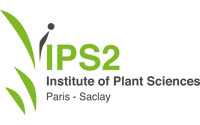New roles for an atypical MAPK module
Mitogen Activated Protein Kinase (MAPK) modules are important plant signaling components involved in developmental processes as well as in responses to environment stresses. They are usually composed of a MAP3 kinase (MAP3K), a MAP2 kinase (MKK) and a MAP kinase (MPK), which activate each other in a serial manner to mediate signaling from the perception point to cellular responses. In 2016, the Stress Signaling team of IPS2, led by Jean Colcombet, reported the identification, in response to drought and the hormone Abscisic Acid, of a new module comprising the uncharacterized MAP3Ks MAP3K17/18, the atypical MKK3 and the C-clade MPKs MPK1/2/7/14. Whereas MAPK modules were thought to be rapidly responsive, the originality of this new atypical module was a rather slow activation, dependent on the transcriptional upregulation of MAP3Ks.
In their latest publication (Sözen et al. Plant Cell), the Stress Signalling group and its collaborators enlarge our understanding of these MAPK-based stress responses by characterizing the module in response to wounding, a damage caused notably by insects. By measuring MAPK activities in a time-course manner and in different Arabidopsis genotypes, the authors notably reveal that the MKK3-MPK1/2/7/14 module is activated by wounding through a Jasmonic Acid-dependent transcriptional up-regulation of the MAP3K14. Interestingly this activation occurs independently of another MAPK module (MKK4/5-MPK3/6), which was already known to be rapidly activated in response to wounding. The co-activation, with different kinetics, of two distinct MAPK modules, upon exposure to a single and similar stress, is a rather unexpected finding which raises interesting hypotheses about the way MAPK signaling can orchestrate dynamic responses in plants.
